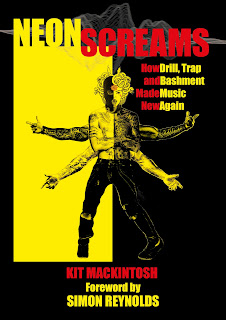But for a while, commentators were predicting the death of music by regurgitation.
As Simon Reynolds wrote in his seminal tome, Retromania (published in 2010):
...retro-consciousness nonetheless seems most chronically prevalent in music. That may well be because it somehow feels especially wrong there. Pop ought to be all about the present tense, surely? It is still considered the domain of the young, and young people aren't supposed to be nostalgic...
However, the youth are fighting back with sounds and imagery that is uniquely theirs, but also reflects life growing up online.
A multi-instrumentalist from New Cross, Kit Mackintosh is all too aware of a paradigm shift that has taken place in the culture, not just music. One that is harder for older types to articulate but one that is instantly recognisable to anyone under the age of 27:
Sci-fi is no longer producing these kinds of omnipresent cultural monuments. It’s not giving a definitive form to the futurism of our collective imagination and that’s actually quite exciting: it makes future music that much more mysterious. In the last fifteen years, new noises have been uncovered by musicians that we have no set way of interpreting or wrapping our imaginations around. Sounds have been created that make no sense; they have no correlates (sic) in the wider culture so they just seem to be completely alien to our ears.
To demonstrate music’s role in documenting this shift, Mackintosh focuses on three areas for study: bashment (a variation of Jamaican dancehall), trap (one of the many mutations hip hop has taken over the last forty years) and drill (a darker, nihilistic mesh of hip hop and UK Garage) and how Auto-Tune (used for pitch correcting vocals and adding effects) has played a part with these genres.
In the case of UK drill, the deliberate rejection of Auto Tune can be seen as a reaction to the realities of life in parts of London where CCTV is an everyday aspect of life, stop and searches predominantly target young black men and gang violence is so common, it has gone unnoticed in certain parts. However, Mackintosh also points out that it has led to a focus on lyrical flow and delivery, highlighting London’s rich heritage of adopting cockney, patois and American lingo to create something new and vibrant.
With mumble rap, Mackintosh makes a very strong case for it not only being a reaction to the overloaded (politically and culturally) 2010’s, but also how its use of Auto-Tune acts as a new kind of psychedelia, pushing the voice into terrain where it ceases to be human and instead becomes post-human. The open use of Oxycontin (and other pharmaceutical pills) by mumble rappers) is also seen as an extension of the desire to go beyond what is humanly possible although, as Mackintosh freely admits, it can also be seen as an indication of the grip that big pharma has on the young.
Written with an exuberance that is infectious and demonstrating a flair for being able to reach beyond mere hyperbole, Neon Screams will send you down YouTube rabbit holes and reinvigorate your belief in the future.
Kit Mackintosh, 2021, Neon Screams: How Drill, Trap and Bashment Made Music New Again. Repeater Books. ISBN-13: 978-1913462246.
⏩ Christopher Owens was a reviewer for Metal Ireland and finds time to study the history and inherent contradictions of Ireland. He is currently the TPQ Friday columnist.







No comments